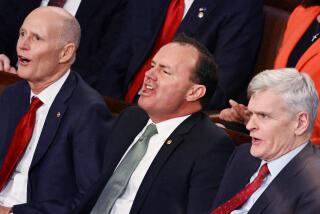Stock Market Gains Favor as Social Security Hedge
WASHINGTON — President Clinton is “strongly leaning” toward supporting a plan to invest surplus Social Security revenues in the stock market to bolster the financial health of the massive retirement fund against the day 30 years from now when it will run out of money, a top administration official said Wednesday.
This approach, compared to benefit cuts or tax increases to head off the funding gap, would be “most attractive to the American people,” Gene Sperling, head of the National Economic Council, told reporters after a closed-door White House meeting between the president and key members of Congress from both parties.
It now appears Clinton has decided that the most realistic way to forge a bipartisan deal on Social Security is to rely on the appeal of tapping into a booming stock market, rather than resorting to the bitter medicine of benefit cuts or tax hikes.
If the money is placed in stocks and bonds, the most contentious issue will be deciding whether individuals should invest their own funds or the government should do it for them, Sperling noted. The president has not decided which approach he favors.
Although higher returns from stocks would be welcome, Sperling acknowledged the inherent riskiness of the volatile stock market. “We would have to be straightforward” in explaining to workers that the value of their investments could fall as well as rise.
Social Security now collects more in payroll taxes than it pays out in benefits and invests the surplus in special issues of Treasury securities. Over the last 70 years, it has earned about 3% a year after inflation, compared with the stock market’s 7% average rate of return.
Economists who presented rival plans at the White House meeting were “emphatic” about the need to bring higher returns to the Social Security system, according to Sperling.
Harvard economist Martin Feldstein called for carving out some of today’s 12.4% Social Security payroll tax to establish investment accounts controlled by individual workers. Those favoring this approach say it would offer individuals a greater sense of control over their future, and it would reduce the threat of political interference in investment selections.
The collective approach was recommended by Robert D. Reischauer of the Brookings Institution, who wants an independent board--patterned after the Federal Reserve Board--to invest up to half of the Social Security surplus in a mix of stocks. Administrative costs would be lower than if individuals did the investing, and the government, not the individual workers, would take the hit in times of declining stock prices.
Republicans generally favor individual accounts, while Democrats like the idea of central investment. The only broad agreement among both parties and the president, Sperling said, is the need to “bring in higher returns to the system.”
Workers and employers now each pay 6.2% of an employee’s salary, up to $68,400 a year, in Social Security taxes. More than 140 million workers are paying taxes, with 44 million beneficiaries collecting payments for retirees, the disabled and their survivors.
The surpluses are projected to continue building until 2012, when the oldest of the baby boomers reach retirement age. In 20 more years, the surplus will have been exhausted and payroll taxes will be able to pay only 75% of promised benefits.
Wednesday was the second day of a two-day White House conference designed by Clinton to get the political players talking to each other, and, Sperling said, the president wanted to help Republicans and Democrats overcome their normal political antipathy. “He understands he needs to provide political cover to anyone who comes forward to contribute to a bipartisan plan,” Sperling said.
Republicans, notably House Ways and Means Committee Chairman Bill Archer of Texas, have insisted that the president come forth with a detailed plan.
Although Clinton stopped well short of that, Sperling made a point of holding out an olive branch to Archer, saying: “We may have our tactical disagreements . . . [but] Chairman Archer is completely sincere, he wants Social Security reform done.”
More to Read
Inside the business of entertainment
The Wide Shot brings you news, analysis and insights on everything from streaming wars to production — and what it all means for the future.
You may occasionally receive promotional content from the Los Angeles Times.










